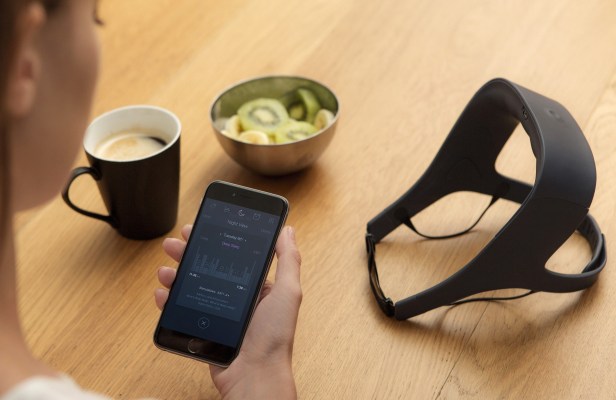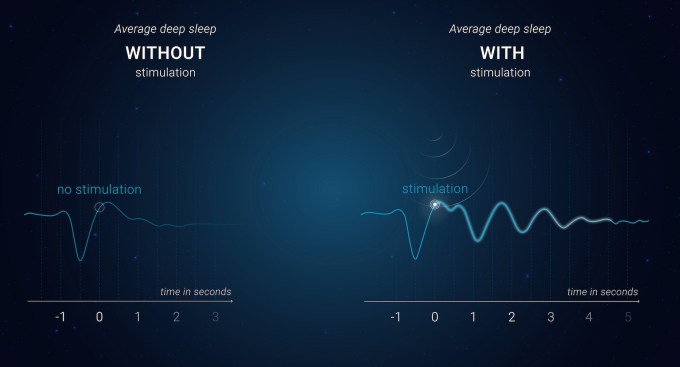French startup Rythm, which makes a tech-infused headset it claims improves sleep quality, announced Tuesday that it’s raised over $11 million from private investors and public grants. The ‘Dreem’ headset was announced last month, but only in a prototype form — this money should help bring it to a planned full consumer release in early 2017.
The idea is this: many restorative functions take place during the deepest phases of your sleep cycle, right? But those cycles are short and get shorter as the night goes on. The Dreem headset uses audio to stimulate the brain in a way that elongates those deep sleep cycles, which may improve the quality of your rest — and possibly memory and other cognitive functions as well.
I talked with Rythm co-founder Hugo Mercier after reading the company’s whitepaper, which left me a bit skeptical as to the scientific basis for the technology. Miniaturized, wearable electroencephalagrams are like toys compared to serious lab-bound equipment, and the idea of affecting deep brain states with bone-conducted audio struck me as whimsical until I read a few studies bearing it out. The brain is a very mysterious organ.
The benefits and methods are a bit hand-wavy at present, but Mercier assured me that the whitepaper is quite out of date and a good deal of research has been done since its publication — with much more on the way.
“We’re not publishing right now because we’re patenting,” he said. “We want to have a big publication, not a small one,” and their scientists are in hot pursuit of more and better data, of which below. He also mentioned, for what it’s worth, that he shares my distaste for pseudoscience.
The funding, Rythm’s first equity round, comes in the form of €7 million from private investors and €3 million in public grants. €2.2m of the latter came from winning two phases of the personalized medicine category in France’s Concours Mondial d’Innovation. Rythm declined to further break down the investment numbers or reveal conditions and other details. The total comes to just over $11m in our American dollars.
The company first talked with Laurent Alexandre, a biotech investor whom Mercier likened to a French Ray Kurzweil — he’s one of these irrepressible “transhumanists” still sadly stuck in a physical body but thankfully ready to invest in elegant ways to escape from it.
Alexandre has pursued the interface of neuroscience and technology for some time, and is interested in the long-term prospects of a non-invasive two-way brain interface like the Dreem. He brought €750,000 to the company early on to help get the concept off the ground.
The other big investor is Xavier Niel, founder of Kima Ventures and 1000 Start-Ups, among other things. His interest lies more in the product itself — a high-tech sleep aid that could grow to incorporate other applications as well.
Of course, the device is still a ways off, as is profitability — both things Mercier said he was up front with his investors about.
“We know that the product is fully working, but it’s not mature enough for a full consumer launch,” Mercier said. Proof of concept is done and the next step is large-scale testing, which the company is doing with an early access program and in clinical trials being conducted with the French military. The $11 million will largely go to engineering and research, while future funding will bolster marketing and manufacturing.
Early 2017 is the target for a consumer release with revised hardware, by which time there will also be considerably more experimental data and scientific reportage — or, at least, that’s the plan.
Mercier expects multiple further investment rounds as the company grows and attempts to break into health and wellness markets. Rythm is currently avoiding serious medical claims with the Dreem, officially saying it merely improves sleep quality generally (though it can then claim credit for the benefits of improved sleep). But the data collected by the Dreem is good enough to detect conditions like sleep apnea, so seeking approval by the FDA and the European Medicines Agency is a distinct possibility for the future.
The goal isn’t just to make a cool sleep-improvement gadget, but to build, as Mercier put it in the company’s press release, “the largest neurotechnology company in the world.” To do so, however, requires quite a bit of solid foundational science, and that takes time and money. Expect to hear more from the company closer to its 2017 product launch.

